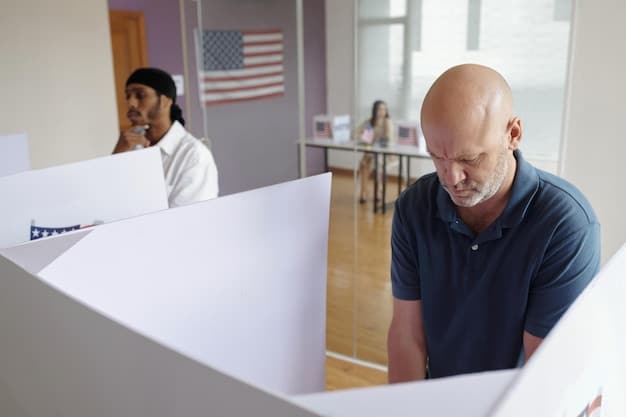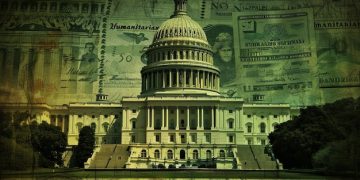Understanding the Role of PACs in Local Elections: Impact and Influence

Political Action Committees (PACs) significantly influence local elections by raising and spending money to support or oppose candidates and ballot initiatives, thereby shaping the political landscape at the community level.
Understanding the Role of Political Action Committees (PACs) in Local Elections is crucial for any informed citizen. These committees play a significant role in how campaigns are funded and how political messages are disseminated at the local level. Let’s delve into how these entities operate and their implications for your community.
What are Political Action Committees (PACs)?
Political Action Committees, or PACs, are organizations established to raise and spend money to elect and defeat candidates. They play a crucial role in funding campaigns and influencing voters.
Understanding how PACs operate is essential for anyone interested in local politics.
Definition and Purpose of PACs
PACs serve as a conduit for contributions from individuals, corporations, and unions to political campaigns. They allow collective action and amplify the financial impact on local elections.
Types of PACs
PACs come in various forms, including:
- Connected PACs: Affiliated with corporations, labor unions, or trade associations.
- Non-Connected PACs: Independent groups that operate without any formal affiliation.
- Super PACs: Can raise and spend unlimited amounts of money but cannot directly coordinate with candidates.
- Hybrid PACs: Combine features of traditional PACs and Super PACs, allowing them to both contribute directly to candidates and make independent expenditures.
This diversity in types allows PACs to engage in elections in different ways, from direct financial support to independent advocacy.

In conclusion, PACs are pivotal players in local elections, acting as financial intermediaries that shape the political discourse.
The Legal Framework Governing PACs
The activities of PACs are regulated by both federal and state laws, designed to ensure transparency and prevent corruption. These regulations, while sometimes complex, are vital for maintaining the integrity of the electoral process.
Let’s take a closer look at the rules that govern them.
Federal Election Campaign Act (FECA)
The FECA, along with its amendments, sets the basic rules for campaign finance in the United States. It establishes limits on contributions and requires disclosure of financial activities.
Contribution Limits
Federal law sets limits on how much PACs can contribute to candidates and other political committees. These limits are adjusted periodically to account for inflation.
Disclosure Requirements
PACs are required to disclose their donors and expenditures to the Federal Election Commission (FEC) or relevant state agencies. This transparency helps the public understand who is funding campaigns.
Understanding these legal requirements is fundamental to understanding how PACs can legally operate within our political system.
How PACs Raise and Spend Money
PACs rely on a variety of fundraising methods and strategic spending to influence elections. Their financial activities can significantly impact campaign outcomes.
Let’s delve in deeper.
Fundraising Strategies
PACs use various strategies to raise money, including:
- Direct Mail: Soliciting contributions through targeted mail campaigns.
- Online Fundraising: Utilizing websites and social media to collect donations.
- Events: Hosting fundraising events and dinners to attract donors.
Expenditure Strategies
The way PACs spend money can be just as important as how they raise it. Their strategies include:
- Direct Contributions: Donating directly to candidates’ campaigns.
- Independent Expenditures: Spending money on advertising and other activities that support or oppose candidates without coordination.
- Issue Advocacy: Funding campaigns that promote specific policy positions.
PACs analyze election dynamics and tailor their spending to maximize their impact.
In summary, the fundraising and expenditure practices of PACs are strategic and multifaceted, aimed at influencing election results.
The Impact of PACs on Local Elections
PACs can significantly influence local elections by providing financial support to candidates and promoting specific policy positions. Their involvement can shape the outcome of races and the direction of local governance.
Here’s what you should know.
Candidate Support
PACs often support candidates who align with their interests by:
- Providing Financial Resources: Helping candidates fund their campaigns.
- Offering Endorsements: Signaling support to voters.
- Mobilizing Volunteers: Helping with campaign activities such as phone banking and door-knocking.
Influence on Policy
PACs can influence local policy by:
- Supporting Candidates with Specific Policy Positions: Helping elect officials who share their views.
- Lobbying Elected Officials: Advocating for specific policies after the election.
- Funding Issue Advocacy Campaigns: Promoting specific policy positions to the public.

By supporting particular candidates and policies, PACs play a crucial role in shaping the political landscape.
Criticisms and Concerns about PACs
Despite their role in facilitating political participation, PACs are often subject to criticism. These concerns include issues of undue influence and transparency.
Let’s consider some key points.
Potential for Undue Influence
Critics argue that PACs can give special interests an outsized voice in politics.
The argument goes that large contributions may sway politicians’ decisions and policies, favoring donors over the broader public interest.
Lack of Transparency
Another concern is that the true sources of PAC funding may not always be clear. This can make it difficult for voters to assess the motives behind a PAC’s activities.
Understanding these criticisms helps provide a balanced perspective on the role and impact of PACs in elections.
Case Studies of PAC Influence in Local Elections
Examining specific examples can illustrate the ways in which PACs influence local elections. These case studies provide concrete evidence of their impact.
Let’s explore a few impactful cases.
Example 1: A School Board Election
In one instance, a PAC funded by a local teachers’ union heavily supported candidates who favored increased school funding and teacher salaries. Their support played a significant role in electing these candidates.
This demonstrates the ability of PACs connected to specific interest groups to shape educational policy at the local level.
Example 2: A City Council Race
In another case, a PAC supported by real estate developers backed candidates who favored zoning changes that would allow for new construction projects. These candidates ultimately won, and the city council approved several large-scale development plans.
This highlights how PACs can influence land use and urban development through local elections.
These examples underscore the significant role PACs play in the outcome and resulting governance of local elections.
| Key Point | Brief Description |
|---|---|
| 💰 PAC Definition | Organizations that raise and spend money to influence elections. |
| 📜 Legal Framework | Regulated by FECA and state laws concerning contribution limits and disclosure. |
| 📣 Campaign Influence | Impact local elections via candidate support and policy influence. |
| 🤔 Criticisms | Concerns over undue influence and lack of transparency. |
Frequently Asked Questions
▼
A PAC’s main purpose is to raise and spend money in order to elect and defeat political candidates as well as to support specific legislative proposals. They act as a financial arm for various interest groups.
▼
The primary difference lies in contribution limits and coordination. PACs have contribution limits and can donate directly to campaigns, while Super PACs face no contribution limits but cannot directly coordinate with campaigns.
▼
Individuals, corporations, labor unions, and other associations can contribute to PACs, though there are often legal limits on how much each entity can donate as set by campaign finance laws.
▼
Federal law specifies the amount that PACs can donate which is subject to change but traditionally ranges in thousands per election. These limits are reviewed and adjusted periodically by the FEC.
▼
PACs influence local policy by supporting candidates who align with their interests through campaign contributions, endorsements, and political advertising. They may also engage in direct lobbying.
Conclusion
Understanding the role and impact of Political Action Committees (PACs) in local elections is essential for informed citizenship. PACs play a major role in shaping who gets elected and what policies are pursued at the local level. Staying informed about their activities and influence helps ensure a transparent and accountable political process.





